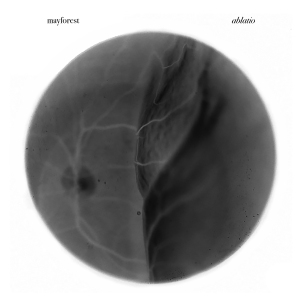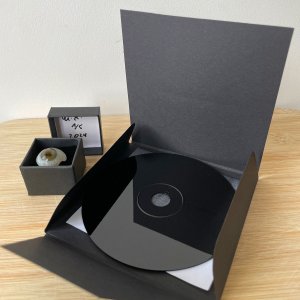 Some may recognize the name mayforest from our review of nocny a couple years back or his self-titled release a few years before that. Christian Maiwald’s music is eminently peaceful, the reflection of what we thought was a relatively placid, carefree life. But then we encountered ablatio, which challenges our assumptions not only of the artist, but of life itself.
Some may recognize the name mayforest from our review of nocny a couple years back or his self-titled release a few years before that. Christian Maiwald’s music is eminently peaceful, the reflection of what we thought was a relatively placid, carefree life. But then we encountered ablatio, which challenges our assumptions not only of the artist, but of life itself.
This is the first release we’ve ever encountered that is offered with a glass eye: and not just any glass eye, but one of five that the artist wore for a year. ablatio gives him the opportunity to tell his story and to share it, quite literally, with others. Suffering from retinal detachment, the artist had the afflicted eye removed as a teenager. All sight disappeared, and the upkeep became overwhelming. According to Maiwald, “the doctors had rarely seen a patient being so relieved after having his eye removed.” After this, he embarked on a career as an ambient artist and reports that he “couldn’t be happier.”
Looking at this eye (and in an unsettling manner, imagining it looking back), one cannot help but imagine how one might feel in the same situation. First, the fear of losing one’s sight, then the loss of binary vision, carrying around an expired organ, the choice of surgery and then the aftermath. Would one be sad, angry, bitter? Maiwald walked a different path, and is still walking it today.
Listening to the single-track ablatio, one can feel the dueling choices in the contrast between the piano and the drone. The track begins as sprightly as a spring day, nary a cloud in sight, cascades of keys announcing a glorious sky. But ever-so-subtly the clouds sneak in, borne on static charges and deep bass rumblings, until a sudden rush of sound and the dissipation of every sense. In the track, the effect is silence; in the eye, the effect is blindness. From here, the track begins to rebuild, both elements present, a tentative peace until the second rush at the conclusion. The track seems to be saying, “take no blessing for granted,” while simultaneously celebrating what remains. A connection might be made to Beethoven, whose deafness didn’t stop him from composing.
We caught up with Christian to ask a few questions about the release and his experience.
 Congratulations on the new release! It’s a beautiful concept, with lots of room for thought. It seems as if in the process of ablation, something was also gained ~ a sense of peace, perhaps. Can you comment on this?
Congratulations on the new release! It’s a beautiful concept, with lots of room for thought. It seems as if in the process of ablation, something was also gained ~ a sense of peace, perhaps. Can you comment on this?
Thank you! I was hoping that it came across that even though something may worsen or end, it’s not necessarily the end. A sense of peace or relief may follow, even though what has been taken away was something good and important. And it´s not necessarily linear, both elements can be intertwined without converging into one, a relief without relief.
Ambient music tends to be quieter and less rushed than other types of music. With fewer elements, one is able to concentrate on what remains. Is this why you are drawn to it as a genre? Do you feel that the music you make reflects your personality?
It definitely comes down to that. There tends to be less – action, harmonic shifts, hooks, drops – but what´s there is more profound. And ambient leaves it open to the listener to have it running in the background or to listen closely. In that respect I don´t really see a difference between ambient and many other kinds of music, whether it´s dance music or some grindcore albums I like. Subtle shifts can be as exciting and moving as a great refrain. I´m not a big gesture person. So ambient definitely reflects my personality. I love the idea of the flaneur, the person who strolls around and enjoys what he´s seeing. In a way I apply that to how I make music, when I fiddle around with different elements, layers, harmonies and allow them to take off into their own directions. At that point my creative part is less composing a piece from A to Z but more sitting, listening and deciding what works. Ambient is perfect for that.
Does the rush of drone and subsequent silence at 3:45 signify a transition, or a new beginning? What about the shorter repetition of this effect at the end?
